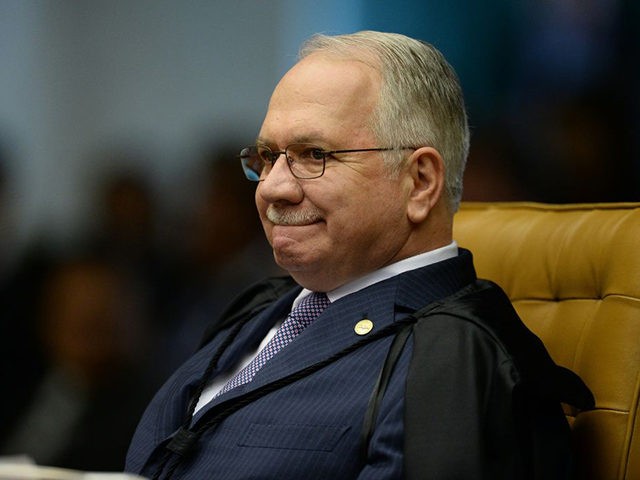Citizens in Curitiba, southern Brazil, organized a caravan protest in front of Supreme Federal Tribunal (STF) Justice Edson Fachin late Wednesday in response to the STF vacating corruption sentences against socialist former President Luiz Inácio Lula da Silva this week.
The STF is Brazil’s supreme court; Fachin received his appointment from Lula protege Dilma Rousseff, who was impeached out of the presidency in 2016.
Lula, president of the country from 2003 to 2011, was arrested and convicted in multiple courts on charges of receiving upwards of $1 million in bribes in the form of expenses related to a luxury beachfront property in Guarujá, a beach town near Sao Paulo. The convictions resulted in a sentence of nearly a decade in prison and the triggering of the “Clean Slate” law, which bans politicians convicted of crimes related to corruption from ever running for office again.
The conviction was the product of a nationwide corruption investigation known as “Operation Car Wash,” which originated in Curitiba, the capital of southern Paraná state. Fachin overturned Lula’s convictions arguing Curitiba did not have jurisdiction over the case and ordered it moved to a court in Brasilia. He notably did not remark in his ruling on the merits of the case, meaning Brasilia may still find Lula guilty and reactivate the “Clean Slate” law.
Lula’s ban from politics took place shortly before the 2018 election, preventing him from an anticipated run against current President Jair Bolsonaro, an anti-communist conservative. Most Brazilian political observers expect Lula, now 75 years old, to run against Bolsonaro in 2022.
Outraged citizens organized a caravan of cars — a socially distant version of a street protest — in front of Fachin’s home in Curitiba on Wednesday to protest his court ruling. Videos of the incident show traffic ground to a halt in front of Fachin’s residents and a cacophony of honking and other noise in support of the event. Some pedestrians also appear on videos wearing the colors of the Brazilian flag, yellow and green, and waving flags. National media identified the protesters as “Bolsonaro supporters” who organized through Whatsapp lists, though some noted the initial group of protesters later attracted other local residents, who did not identify themselves by any particular partisan identity.
No reports of violence or criminal behavior followed the event.
The protest was reportedly the first such event of its kind since the Lula ruling.
Fachin issued his ruling Monday, so Brazilians have not had a chance to organize weekend events, which are typically much larger and better attended. The ruling stated that insufficient evidence existed tying Lula’s case to Paraná, making Curitiba an illegitimate venue for the trial and the judge presiding in that case, Sergio Moro, ineligible to do so.
Moro, who approved most of the “Operation Car Wash” cases, became seen as a national hero in light of the mass arrests of politicians that followed, including several members of Congress of a variety of parties (Brazil is a multiparty democracy where dozens of parties, ranging from extreme left to bureaucratic center to far right, compete for legislative seats). The investigation began in Curitiba as a local money laundering case involving a car wash, hence the name, that led to the discovery of millions of dollars in kickbacks. Private contractors — most prominently the corruption giant Odebrecht — would agree to give politicians a portion of the excess money if granted lucrative state contracts for infrastructure projects. The politicians would grant significantly more taxpayers’ dollars in those contracts than the money necessary to complete the work and receive a portion of the illicit profits.
Bolsonaro initially appointed Moro Minister of Justice following his election in 2018, but Moro resigned in 2020, claiming Bolsonaro had impaired his ability to fully investigate corrupt politicians. Bolsonaro refuted Moro’s claims and accused him of being “committed to his ego” and too enamored by his own celebrity to properly do his job.
The STF is set to comment on Moro’s work itself Thursday. As Fachin did not remark in his ruling on the evidence that Moro allowed into a court of law in the Lula case, the Brasilia court processing the case has access to that evidence. That may change Thursday if the STF finds Moro allowed unconstitutional evidence into the court. If the STF rules the evidence presented in Lula’s case is not admissible, prosecutors would have to begin the entire case from scratch, possibly beginning with new depositions, visits to relevant locations, and other investigative processes that may take years.
The STF is currently controlled by justices — or ministers, as they are referred to in Portuguese — appointed by presidents belonging to the socialist Workers’ Party (PT), namely Lula and Rousseff. Following sweeping victories for Bolsonaro allies in Congress in February, the court remains the last branch of federal government not controlled by conservatives. A significant chance exists that they would bar the evidence that made Lula’s conviction possible. The court has faced heavy criticism for years that it has become increasingly radical in its rulings, not just in defense of leftist politicians, but in attacking the free speech of political opponents. In a recent high-profile case, the STF ordered the arrest of a member of Congress, Daniel Silveira, over a YouTube video in which he insulted members of the court. The court is scheduled to deliberate his pre-trial release Thursday; he has been in jail for nearly a month.
Last year, dozens of journalists, YouTube commentators, and comedians who had publicly supported Bolsonaro awoke to violent police raids of their homes after the STF ordered their arrests for propagating “fake news,” which is not a formal crime in Brazil. Some fled the country after their arrest, while others are fighting their legal cases; the STF has not articulated a constitutional basis for the arrests.

COMMENTS
Please let us know if you're having issues with commenting.